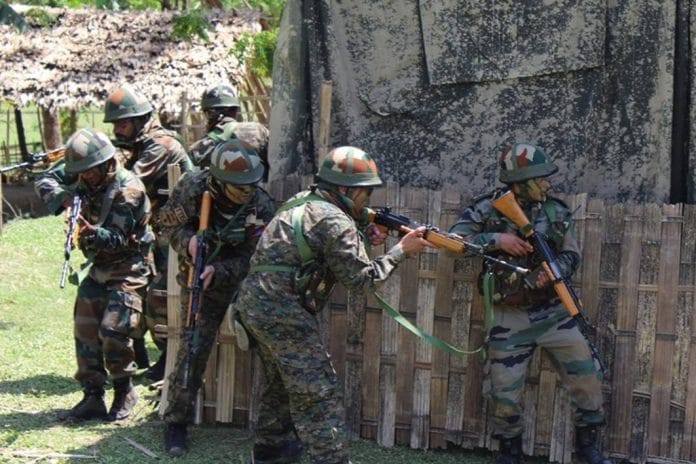The surgical strike on terror launchpads was deemed a success in India but did it achieve what it was meant to?
A year ago, Indian army sneaked across the Line of Control in the night, entered territory under Pakistan’s control and launched surgical strikes against terrorist launch pads.
The stealth operation was a retaliation against the terrorist attack on the Uri military base near the border in Kashmir, allegedly carried out by Pakistani groups.
What did India’s surgical strike against terrorists in Pakistan in 2016 really achieve? We ask experts.
Pakistan cannot rule out other asymmetrical and unanticipated Indian responses in the future
 Arun K. Singh
Arun K. Singh
Former ambassador to the US
Indian army’s surgical strike across the LOC, about a year ago, has been remarkable for the lack of any international concern or reaction it could otherwise have generated, and the Indian government’s decision to make it public.
Absence of any significant international reaction has been due to several factors. One, there was no escalation. An embarrassed Pakistan denied it, and thus gave up on cause for escalation. It did ratchet up firing across the LOC for some time, but periodic intensification of firing has been a recurring feature now for the past couple of years, and did not merit any enhanced international anxiety.
Second, US responses to terrorist threats from Afghanistan, Yemen, Somalia etc have dented international norms respecting sovereign territory or lines of control when terrorism is involved. No major country could fault India’s decision to take preemptive measures against terrorist attacks, crossing lines held by armies, especially since 9/11.
Third, Pakistan’s international standing and image has taken a beating with its continued involvement with and support for terrorist groups. Not just India, but Afghanistan too has been vocally critical of Pakistan’s destabilising activities through the Taliban and the Haqqani network. President Trump’s strident criticism of Pakistan in his August 21 speech this year is a reflection of growing antipathy, despite continued dependence on Pakistan for transit to Afghanistan to provision US troops.
India’s decision to make the strike public would also create uncertainty for Pakistani officials, since this was not business as usual any more. They could not rule out other asymmetrical and unanticipated Indian responses in the future. Otherwise, there was the usual cycle of Indian anger, heightened rhetoric, followed by disruption of links and dialogue, and resumption after a gap.
A line was drawn last year, and announced. Ownership matters
 Manvendra Singh
Manvendra Singh
BJP MLA in Rajasthan and Editor-in Chief of Defence & Security Alert
All military operations have definite objectives, political as well as service-centric. Operations within the country have definite law and order, ‘in support of civil authority’-type of objectives. They are also a demonstration of the resolve of the state, to impose its will, gently or heavily. That is the larger political message — don’t mess with us.
It is also the underlined message from the ‘surgical strikes’ conducted across the Line of Control a year ago.
India and Pakistan live as uneasy neighbours across the LoC. Bickering and firing lead to anger at most times. And sometimes crossing the line too. Such actions have been infrequent, but not non-existent. They’ve happened in the past, and may happen in the future too. But something changed a year ago.
The ‘surgical strikes’ of September 2016 was the first trans-LoC operation to be owned politically. Whenever operations occurred in the past they were not declared publicly, and not acknowledged militarily too. A shroud of silence was imposed and no discussions happened. But all that changed in September 2016 when operations were announced as ‘surgical strikes’ and overt political ownership declared. This has broken new operational ground.
The explicit ownership has put greater stress on Pakistan to institute LoC management measures. Violence within the Valley may well have increased, but the impunity with which cross-LoC terrorists attacked fixed installations, is, hopefully a thing of the past. A line has been drawn, and announced.
Surgical strikes sent a clear signal that India would defend itself actively, and rally global support
 Alyssa Ayres
Alyssa Ayres
Senior Fellow for India/Pakistan/South Asia at The Council on Foreign Relations, and Former State deputy assistant secretary for South Asia.
One year after India’s “surgical strikes” operation across the Line of Control to prevent an imminent terrorist attack, two facts are clear.
The first is that India’s diplomacy to explain its decision and rally other powers to its side has succeeded. Both the Obama and now the Trump administration have unambiguously called upon Pakistan to go after all terrorists, not just a select few, siding with India on this core question, and New Delhi has also secured strong statements against terrorism through its BRICS diplomacy and its bilateral conversations.
The second is that, while a terrorist attack similar to Uri, Pathankot, or other recent onslaughts has not recurred, Pakistan-based terrorist groups focused on India still face few constraints. The Lashkar-e-Taiba is trying to register as a political party without even a hint of renouncing violence.
So while the surgical strikes sent a clear signal to Rawalpindi that New Delhi would defend itself actively, and would be able to rally the world to its support, Pakistan’s leaders have not made any demonstrable effort to bring India-focused terrorist groups to justice. (In fact, following President Trump’s speech unveiling the new U.S. South Asia policy—in which Trump spoke of terrorist safe havens in Pakistan—Pakistan’s foreign office entirely denied their existence and called the idea of “safe havens” a false narrative.)
Tensions will remain as long as the precipitating problem—the flouting of Islamabad’s obligation as a state to prevent the use of its territory for terrorism—remains. On this count, sufficient incentives to shape different choices by Pakistan have yet to be identified—by any country.
The earlier policy of ‘restraint’ seems to have undergone a shift
 Raza Rumi
Raza Rumi
Editor, Daily Times, visiting faculty at Cornell University and Ithaca College.
The so called ‘surgical strikes’ despite the hype haven’t changed much in the bilateral relations. The way these strikes were packaged by the mainstream Indian media for domestic audiences created a sense of ‘victory’ over the adversary i.e. Pakistan. The evidence on ground was tentative at best and sections of Indian media also confirmed that.
In Pakistan, the propaganda was met by equally well-packaged propaganda and the vast majority of Pakistanis think that the strikes were merely a bogey by an anti-Pakistan and ‘anti-Muslim’ government. Regardless of how deep or effective these strikes were, the earlier policy of ‘restraint’ seems to have undergone a shift – at least in theory.
The saddest part of these strikes is the role of media in both countries and how they turned into partisan vehicle of state propaganda. Not unlike the United States where the mainstream media is a party to national security architecture, Indian and Pakistani corporate media failed to uphold their duties as independent, citizen-oriented vehicles of verifying information.
The term public interest has been subsumed under what we call the ‘national interest’ in our region. And this is not a good omen for the future of India-Pakistan relations where state actors’ high pitched rhetoric will be augmented and abetted by media.
In the past one year, no progress has been made on resetting bilateral ties and both countries are more interested in keeping their domestic constituencies content with hawkish rhetoric overlooking the dangers ahead. Perhaps the greatest threat shared by India, Pakistan and Bangladesh is climate change and the chances for devising a joint approach to prepare for natural disasters and global warming never seemed so slim.
Surgical strikes was more a message than any kind of deterrent that would end cross-border terrorism
 Shiv Aroor
Shiv Aroor
Co-Author ‘India’s Most Fearless: True Stories of Modern Military Heroes’
In the one year since India’s special forces carried out raids in Pakistan-occupied Kashmir, it is clear that the mission was much more a message than any kind of deterrent that would end cross-border terrorism.
The mission was a spectacular tactical achievement — four terror launchpads were destroyed, 38-40 terrorists and Pakistan Army personnel killed with zero casualties to our own. But it is the government’s decision to amplify the victory by announcing it to the world that gives it a special place among comparable missions in the past.
Speaking at the launch of ‘India’s Most Fearless’, an omnibus of true tales of military heroism, former Army chief General Dalbir Singh said the success of the Myanmar strikes had sparked an impulse for months to carry out a similar trans-LoC strike in PoK. The Uri strike proved to be the trigger.
The possibility of more cross-border strikes is real. Army chief General Bipin Rawat has said it twice in the last few weeks, though it must be said that similar missions will be exponentially more difficult in the post-2016 scenario. Any such mission will need to further the overarching intent of deterrence, though this has proven to be more problematic than that undeniable political message they have brought with them.
Finally, the useful consequence of the 2016 mission has also been greater attention on modernisation of the special forces and a sharper focus on some of their training methodologies.







“Indian army’s surgical strike across the LOC, about a year ago, has been remarkable for the lack of any international concern or reaction…”
Probably because no one who isnt drinking the indian koolaid believes that it actually happened.